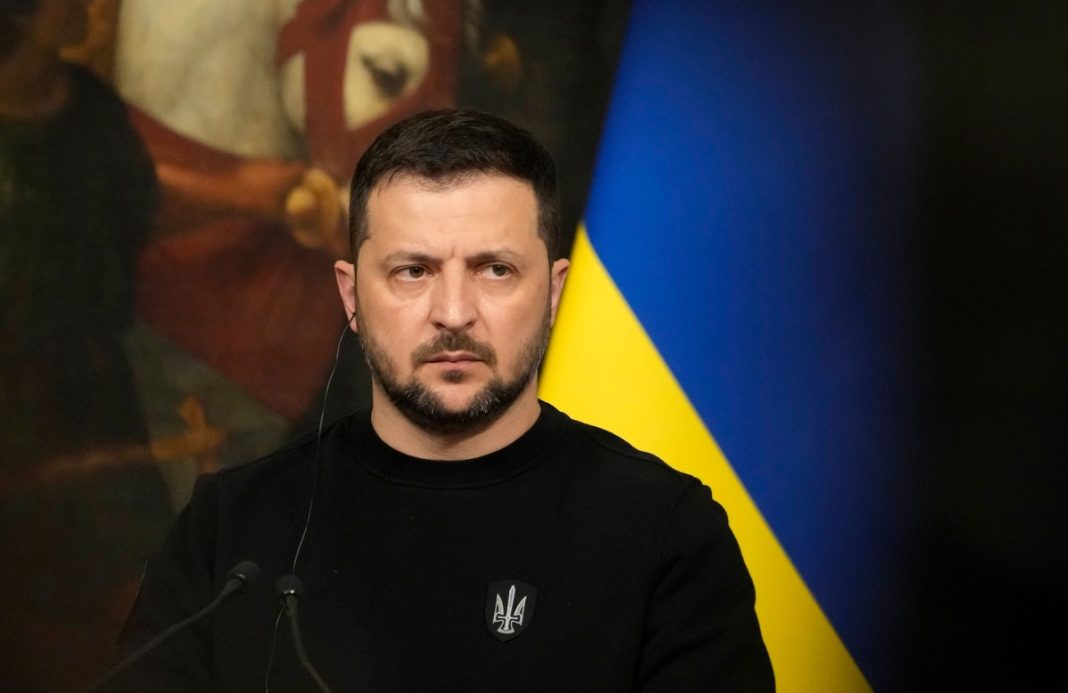KYIV, Ukrain — Ukrainian President Volodymyr Zelenskyy has presented a long-anticipated “victory plan” aimed at strengthening Ukraine’s position enough to end its war with Russia.
Addressing parliament in Kyiv on Wednesday, October 16, 2024, Zelenskyy laid out a strategy that he said could finish the war next year, provided Ukraine receives further support from its Western allies.
The key points of the plan include Ukraine’s formal invitation to join NATO, the lifting of Western bans on long-range strikes into Russian territory, and a refusal to cede any Ukrainian territory to Russia.
Zelenskyy also called for continued military operations inside Russia’s western Kursk region and insisted that Ukraine’s sovereignty remains non-negotiable.
“We are at war with Russia on the battlefield, in international relations, in the economy, in the information sphere, and in people’s hearts,” Zelenskyy told Ukrainian lawmakers.
He vowed not to concede any Ukrainian territory and stressed the need for Ukraine to force Russia into negotiations from a position of strength.
Key Elements of Zelenskyy’s ‘Victory Plan’
The plan, which Zelenskyy intends to present at an EU summit on Thursday, consists of five major points:
- NATO Membership: A formal invitation for Ukraine to join the NATO military alliance.
- Military Strengthening: Strengthening Ukraine’s defense capabilities, including securing permission from allies to strike deep into Russian territory with Western-supplied long-range weapons.
- Deterrent Forces: Establishing a non-nuclear strategic deterrent package on Ukrainian soil to contain Russia.
- Resource and Economic Protection: Joint protection and utilization of Ukraine’s critical natural resources by the U.S. and EU.
- Post-War Military Repositioning: Replacing some U.S. troops stationed in Europe with Ukrainian forces during the post-war period.
Three additional components of the plan were kept secret and will only be shared with Ukraine’s key international partners, Zelenskyy said.
Mixed Reactions to the Plan
Zelenskyy’s proposal has received mixed reactions from international and domestic observers.
In Kyiv, residents expressed support for the plan, with many agreeing that no territory should be ceded to Russia.
“We should not give up territory,” said Anatoly, a resident of the Ukrainian capital.
However, the feasibility of the plan remains in question, particularly as Ukraine’s Western allies weigh the implications of deeper involvement in the conflict.
NATO’s new Secretary General, Mark Rutte, described the plan as a “strong signal” from Ukraine but refrained from offering full support without further analysis.
“That doesn’t mean that I here can say I support the whole plan—there are many issues that we have to understand better,” Rutte said.
He reiterated his confidence that Ukraine would eventually join NATO.
The Biden administration has reportedly expressed concerns about the plan, suggesting it lacks a comprehensive strategy and is primarily a request for more weapons and lifted restrictions on long-range strikes.
As the U.S. heads toward a presidential election, there is growing pressure to avoid further escalation with Russia.
Analysts in both Ukraine and the West have noted that Zelenskyy’s proposal could intensify the conflict rather than bring it to a close.
Kremlin’s Dismissal and Western Skepticism
The Kremlin swiftly rejected Zelenskyy’s “victory plan,” with spokesperson Dmitry Peskov calling it “ephemeral” and urging Kyiv to “sober up.”
Moscow continues to insist that Ukraine’s current strategy is futile and that the war will only end when Ukraine recognises the limits of its ambitions.
Zelenskyy also used his address to criticise China, Iran, and North Korea for their backing of Russia, labelling them a “coalition of criminals.”
He further described Russian President Vladimir Putin as having “gone mad” in his pursuit of war.
Ukraine’s Continuing Struggle
Despite Zelenskyy’s defiant tone, the realities on the ground remain dire.
The increasing death toll, controversial military mobilisation laws, and ongoing Russian assaults on Ukrainian territory have strained national morale.
Some analysts argue that any potential peace deal would likely involve Ukraine conceding territory in exchange for security guarantees—something Zelenskyy has categorically rejected.
Zelenskyy acknowledged the war fatigue in his address, admitting that “victory has become for some an uncomfortable word and it’s not easy to achieve.”
Still, he doubled down on his determination to force Russia to negotiate by strengthening Ukraine’s military.
Ukraine’s Dependence on Western Aid
Zelenskyy’s plan heavily relies on continued Western aid, particularly from the U.S.
The Ukrainian president briefed U.S. President Joe Biden on the plan and thanked him for a new $425 million defence assistance package, which includes air defence systems and long-range weapons.
However, future support will likely hinge on the outcome of the 2024 U.S. presidential election, with candidates Kamala Harris and Donald Trump both having been presented with the plan earlier this year.
For Zelenskyy, the path to victory is tied to securing stronger backing from Ukraine’s Western allies.
However, it remains uncertain whether the international community will fully endorse his bold vision for ending the war, or whether concerns over escalation will prompt more cautious support.
As the war drags into its third year, Zelenskyy’s “victory plan” represents a high-stakes gamble to maintain Ukraine’s momentum and push for a resolution—one that may hinge on decisions made far beyond Kyiv.







